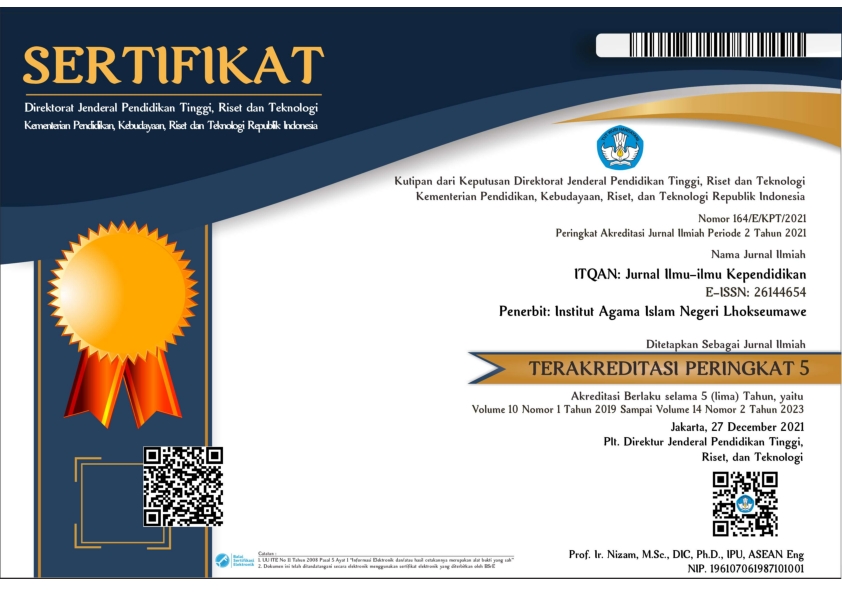Konsep Dasar Pengelolaan Kelas dalam Tinjauan Psikologi Manajemen
Main Article Content
Maryati Salmiah
ِAbdul Aziz Rusman
Zainal Abidin
Improving the quality of education is determined by the implementation of education management standards. An important factor for the success of learning is decided by the teacher's insight into classroom management. Library research is used to find answers to a problem by carrying out some activities to collect, process, and conclude data. Based on the data in this study, it was concluded that the objectives of classroom management: 1) to create conducive classroom situations and conditions, 2) to eliminate obstacles in teaching and learning interactions, 3) to provide and manage learning facilities, 4) to foster and to guide according to individual characteristics. There are three components in classroom management, namely: physical conditions, socio-emotional conditions, and organizational conditions. Actions that need to be taken in managing the class are preventive actions, corrective actions, and curative actions.
Arikunto, S. (2017). Pengembangan Instrumen Penelitian dan Penilaian Program. Yogyakarta: Pustaka Pelajar.
Arikunto, S., Suhardjono, & Supardi. (2015). Penelitian Tindakan Kelas (Edisi Revisi). Jakarta: Bumi Aksara.
Bafadal, I. (2004). Peningkatan Profesionalisme Guru Sekolah Dasar (1st ed.). Jakarta: Bumi Aksara.
Davis, B. G. (2013). Perangkat Pembelajaran. Jakarta: Rajawali Pers.
Djamarah, S. B. (2002). Psikologi Belajar. Jakarta: Rineka Cipta.
Djamarah, S. B., & Aswan, Z. (2013). Strategi Belajar Mengajar. Jakarta: Rineka Cipta.
Emmer, E. T., & Evertson, C. M. (2012). Classroom Management for Middle and High School Teachers (9th Edition). California: Pearson Education Inc.
Evertson, C. M., & Emmer, E. T. (2012). Classroom Management for Elementary Teachers (9th Edition). New Jersey: Pearson Education.
Gronlund, N. E. (1974). Individualizing Classroom Instruction. MacMillan Publishing Company.
Handy, C. (2018). Curriculum Planning and Development. KEY ISSUES, 148.
Hayes, J. (2018). The Theory and Practice of Change Management. Palgrave.
Johnson, D. W., & Johnson, R. T. (2018). Cooperative Learning: The Foundation for Active Learning. Active Learning—Beyond the Future.
Karatas, A., & Gürbüz, O. A. (2016). Environmental Education as a Tool for Increasing Environmental Awareness of Vocational School Students. The Anthropologist, 23(3), 378–384.
Liang, T. Y. (2017). Complexity-Intelligence Strategy. https://doi.org/10.1142/10296
Liu, X.-Y., Härtel, C. E. J., & Sun, J. J.-M. (2014). The Workgroup Emotional Climate Scale. Group & Organization Management, 39(6), 626–663. https://doi.org/10.1177/1059601114554453
Menter, I., & Assunção Flores, M. (2021). Teacher Education, Teacher Professionalism and Research: International Trends, Future Directions. European Journal of Teacher Education, 44(1), 1–4. https://doi.org/10.1080/02619768.2020.1850550
Mirshad, Z. (2014). Persamaam Model pemikiran al-Ghaza dan Abraham Maslow tentang model motivasi konsumsi. UIN Suan Ampel Surabaya.
Mirzaqon. T, A., & . B. P. (2017). Studi Kepustakaan Mengenai Landasan Teori dan Praktik Konseling Expressive Writing. Jurnal BK Unesa, 8.
Mudasir. (2011). Manajemen Kelas (1st ed.). Pekan Baru: Zafana Publishing.
Mukhtar, M. (2017). Pemasaran dan Upaya dalam Mempengaruhi Harapan Stakeholder dalam Lembaga Pendidikan Islam. Tarbawi : Jurnal Pendidikan Islam, 14(2). https://doi.org/10.34001/tarbawi.v14i2.621
Mulyasa, D. (2011). Pendidikan Bermutu dan Berdaya Saing. Bandung: Rosda Karya.
Park, J.-H., & Byun, S. (2020). Principal Support, Professional Learning Community, and Group-Level Teacher Expectations. School Effectiveness and School Improvement, 1–23. https://doi.org/10.1080/09243453.2020.1764061
Pidarta, M. (2007). Landasan Kependidikan (2nd ed.). Jakarta: Rineka Cipta.
Riding, R. (2002). School Learning and Cognitive Style. London: David Fulton Publishers.
Terry, G. R. (2009). Prinsip-Prinsip Manajemen. Jakarta: Bumi Aksara.
Watkins, D. (2000). Learning and Teaching: A Cross-Cultural Perspective. School Leadership & Management, 20(2), 161–173. https://doi.org/10.1080/13632430050011407
Winarni, E. W. (2018). Teori dan Praktik Penelitian Kuantitatif Kualitatif: Penelitian Tindakan Kelas (PTK) Research and Development (R&D). Jakarta: Bumi Aksara.
Wiyani, N. A. (2013). Desain Pembelajaran Pendidikan. Yogyakarta: Ar-Ruzz Media.
Zamroni, Z. (2019). Innovation of Learning Management in Madrasah Level. Dinamika Ilmu: Jurnal Pendidikan, 19(2), 337–349.



